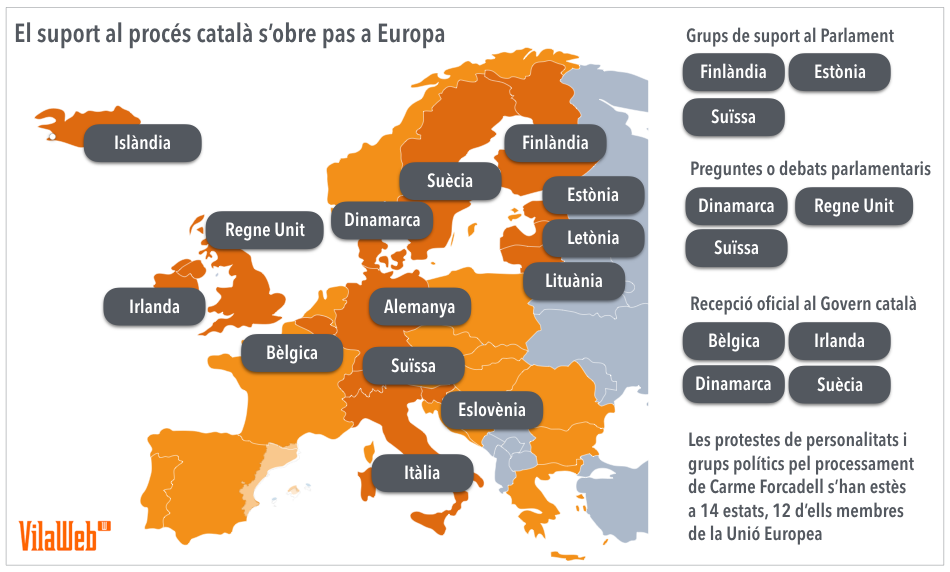19.06.2018 - 08:09
|
Actualització: 19.06.2018 - 10:09
From Ian Duncan, the English Conservative MP, to Paolo Tancredi, the Italian centrist MP. From Elin Jones, president of the National Assembly for Wales, to the fourteen Swiss legislators from every party in the national chamber. From Gerry Adams, leader of Sinn Feinn, in Ireland, to Bernhard von Grünberg, the Social-Democrat German representative. From Nikollaj Villumsen, the Danish anti-capitalist legislator, to Ivo Vajgl, MEP and former foreign minister of Slovenia.
These names are just a sample of the diverse group of politicians across Europe who have recently expressed their concern regarding the legal case brought against Carme Forcadell, the president of the parliament of Catalonia, for allowing a debate on Catalan independence from Spain.
The parliaments of Denmark and Switzerland are set to debate the case of Forcadell. Meanwhile, the Irish parliament has asked its president to make its concern known to the European Council. And in the British House of Commons, legislators from the six parties represented in the chamber, including Labour and Liberal Democrats, have signed a joint motion of support for Forcadell.
Spain’s judicial attack on the Catalan parliament has set off alarms throughout Europe, raising concerns of an authoritarian drift targeting the nation of Catalonia. In recent years, Spanish diplomacy has issued sharp warnings and made efforts to further the argument that, were Catalonia to continue down the path toward independence, it would soon find itself isolated and alone, yet this has not come to pass.
The consolidation of far-reaching initiatives, such as the formation of parliamentary friendship groups, and the more generalized response to the Spanish government’s repressive tactics, have only broadened the interest of politicians of all stripes and countries toward the situation in Catalonia, and increased their sympathy. To the point that we can begin to draw a new map showing the European countries where politicians are paying the most attention to the so-called ‘Catalan process’, the countries where the clearest signs of support are coming from.
Denmark and Switzerland, the most committed
Undoubtedly, so far the two countries that have shown the most steadfast support for the Catalan process have been Denmark and Switzerland. The parliaments of both countries have introduced motions demanding a democratic and agreed-upon solution to the Catalan question. The Swiss government has even offered to mediate between the Catalan and Spanish governments.
Following the prosecution of Carme Forcadell, the Danish Foreign Minister has been asked by parliament to issue an official statement making the country’s position publicly known; meanwhile, representatives from every party represented in the Swiss chamber (Socialists, Liberals, Greens, Christian Democrats, Radicals, and Centrists) have signed a motion of support.
The Scandinavian bloc is shaping up as the most homogenous as regards Catalonia
Denmark is part of the Scandinavian bloc, a group of countries with a strong democratic tradition, where the question of Catalan independence has been debated in political circles for some time now. There have been gestures of solidarity from Swedish and Finnish parliamentarians, in addition to the motion introduced in the Danish parliament.
A parliamentary friendship group supporting Catalonia was established in Finland a few weeks ago, one of a total of three such official groups in various European parliaments, and Raül Romeva, Catalan foreign affairs minister, was officially received. Pro-Spain factions in the Finnish parliament tried to take the opportunity to manipulate public opinion, levering the fact that the president of the friendship group is a member of the nationalist Finns Party, yet never mentioning the fact that the vice-president of the parliamentary friendship group is a member of Podemos’ Finnish counterpart, and that the group as a whole includes representatives from every party in the chamber.
The three Baltic countries, pioneering supporters biding their time
The second European parliament to establish a friendship group with Catalonia has been Estonia, the most advanced of the three Baltic republics. Latvia was the first European state to support the Catalan process, with statements from the prime minister unleashing a diplomatic crisis with Spain.
Diplomatic pressure from Spain has indeed diminished public expressions of support for Catalonia, but the three Baltic governments nevertheless remain a key part of the internationalization strategy of the independence cause. Recently, the Lithuanian government included a question in its regular opinion survey to gauge whether Lithuanians would support recognizing an independent Catalonia if it were to secede unilaterally without a go-ahead from Spain. The result was favourable to recognizing the Catalan state.
The British Isles emerging as another locus of support
Immersed in the enormous headache that is Brexit, and with very bad relations with Spain—particularly in the case of the United Kingdom—the British Isles are seeing an increase of support for the Catalan process.
In the United Kingdom, the political efforts of the Scottish, Welsh, and Irish nationalists have spearheaded the region’s support for Catalonia, but for some time now, politicians from the major British political parties, including the Conservatives, Labour, and Liberal Democrats, have added their voices to the concern expressed by others regarding the situation in Catalonia, and some have explicitly come out in support of independence for Catalonia. Additionally, Caroline Lucas, Green party leader and member of the House of Commons, has co-sponsored a motion of support that was introduced in the chamber.
Ireland is one of the countries where, owing to history and tradition, Catalan independence is viewed more favourably by the political class. Separatist groups, such as Sinn Fein, have lead gestures of solidarity with Catalonia that have spread to politicians of other parties.
Slovenia, a backing stemming from its own experience of independence
Another country that has consistently supported Catalonia over the years is Slovenia. This is partly because of the support Catalonia gave the Slovenian government at the time of Slovenian independence, and partly because the Slovenian people have built a very modern and advanced state where the reach of democratic reform far exceed that of the rest of countries from the former Yugoslavia.
Following the prosecution of Carme Forcadell, there have been high-profile reactions coming out of the Alpine country. The most significant is that of Ivo Vajgl, MEP and former foreign minister. Vajgl decried Spain’s move and urged it to ‘play by the universal rules and language of democracy’.
Belgium, a special case
The Belgian case is a very special one, as the debate on Catalan independence has reached the highest echelons of government, with a cabinet-level discussion on whether it should support Catalan independence even without an agreement with Spain.
The great political force of Flemish nationalism is the main reason for such explicit support, as the Flemish separatists are the main party in Belgium’s governing coalition. The Belgian parliament is one of four European parliaments to have officially received the Catalan government to learn first-hand how the independence process might play out. The remaining three are the parliaments of Ireland, Sweden, and Denmark.
In Germany, Italy, Iceland … protests are spreading
Without reaching the levels of support seen in some other countries, Carme Forcadell’s prosecution has also brought about public expressions of support for the Catalan process in countries such as Iceland, Germany, and Italy, as well as the voicing of concern regarding the risk of democratic involution in Spain.
The case of Germany and Italy is especially interesting because politicians from major parties have expressed their opinions. In Germany, Bernhard von Grünberg, a social-democratic regional representative, made a very direct statement and asked Chancellor Merkel to approach Spain’s central government to denounce Forcadell’s prosecution.
In Italy, the protest has come, mainly, from the president of the Parliamentary Affairs Committee, Paolo Trancredi. This centrist legislator, a member of Berlusconi’s party, warned Spain that prosecuting Forcadell ‘just makes things worse’. Another Italian legislator, Giuseppe Civati, leader of the leftist platform Possible, defended the Catalan people’s right to decide their political future at the ballot box, and criticized the Spanish government’s position.


